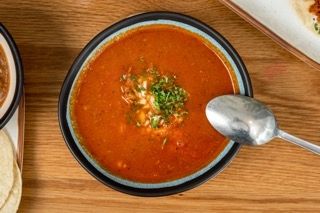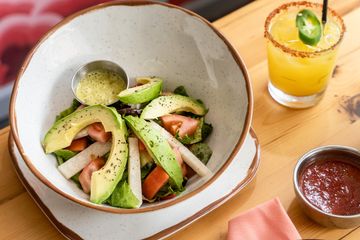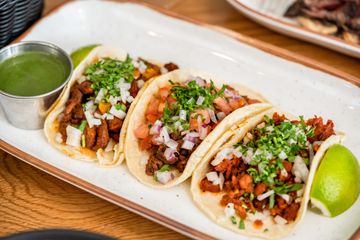Is Mexican Food Healthy? Unboxing the Nutritional Benefits of Conventional Ingredients
The inquiry of whether Mexican food is healthy invites an expedition of its standard ingredients. Beans and corn act as foundational staples, rich in protein and fiber. Avocados provide valuable fats, while numerous herbs and seasonings include taste and health and wellness advantages - hand crafted margarita. With each other, these parts develop a tapestry of nutrition. Nonetheless, the healthfulness of Mexican food commonly depends on preparation techniques and portion dimensions. What role do these elements play in establishing its general dietary value?
The Power of Beans: Protein and Fiber-Rich Staples
Commonly overlooked, beans offer as a keystone of Mexican cuisine, using a riches of nutritional advantages. Rich in healthy protein, they are a superb plant-based option for those seeking to fulfill their nutritional healthy protein needs. This high protein web content supports muscle repair service and development, making beans important for both meat-eaters and vegetarians alike. Additionally, beans are an exceptional source of nutritional fiber, which aids in digestion and advertises a sensation of fullness, potentially assisting with weight monitoring.
The variety of beans utilized in Mexican meals, such as black beans, pinto beans, and kidney beans, adds to a varied taste account and can improve dishes nutritionally. Additionally, beans are reduced in fat and include essential minerals and vitamins, consisting of magnesium, iron, and folate. Together, these characteristics make beans a vital active ingredient, providing both nutrients and sustenance in traditional Mexican fare.

Corn: a Versatile Grain With Nutritional Advantages
Corn stands out as a flexible grain essential to Mexican cuisine, celebrated not only for its cooking applications but likewise for its excellent dietary profile. As a main active ingredient in recipes like tortillas, tamales, and pozole, corn provides vital nutrients that add to a balanced diet. Rich in carbs, it works as a significant energy source, while additionally being reduced in fat, making it a positive option for numerous nutritional needs.
Corn is an excellent resource of dietary fiber, which helps in digestion and promotes satiety. It consists of substantial amounts of vitamins such as B-complex vitamins, which are essential for basal metabolism. The existence of anti-oxidants, particularly carotenoids, adds to general health by decreasing oxidative tension. In addition, corn is gluten-free, accommodating those with gluten level of sensitivities. On the whole, the dietary benefits of corn emphasize its value in standard Mexican food and its function in a healthy diet.
Avocados: Healthy Fats and Nutrients in Every Bite
Avocados play a significant role in Mexican cuisine, enhancing meals with their luscious texture and rich taste. Beyond their cooking appeal, avocados are celebrated for their remarkable nutritional profile. They are a rich source of healthy monounsaturated fats, which can aid reduced poor cholesterol levels and assistance heart health and wellness. Furthermore, avocados are loaded with vital nutrients, consisting of potassium, vitamin E, and B vitamins, adding to general health.
The high fiber content in avocados aids food digestion and promotes satiation, making them a beneficial addition to any type of meal. Their distinct nutrient make-up can also support skin health and wellness and supply anti-inflammatory benefits. Integrating avocados right into conventional Mexican meals or appreciating them as a standalone snack can enhance both flavor and nutrition, showing why they are a cherished staple in Mexican cuisine. In general, avocados supply a scrumptious means to delight in healthy fats and critical nutrients in every bite.

Flavors and Herbs: Flavorful Health Boosters
While taking pleasure in the abundant flavors of Mexican cuisine, one can not overlook the vital function that spices and herbs play in boosting both taste and health and wellness. Active ingredients such as chili, oregano, and cilantro peppers not only add to the vibrant taste profile but likewise offer significant wellness advantages. Cilantro is understood for its detoxing buildings, aiding to get rid of hefty steels from the body, while oregano is loaded with antioxidants and best mexican westchester NY has anti-inflammatory results.
Chili peppers, a staple in many Mexican dishes, contain capsaicin, which has actually been connected to boosted metabolism and discomfort alleviation. In addition, spices like cumin and coriander support food digestion and might assist in blood sugar level regulation. Integrating these delicious health and wellness boosters into meals not just improves the culinary experience yet additionally advertises general well-being, making Mexican food not just scrumptious, however additionally nutritionally advantageous.
Standard Food Preparation Techniques: Enhancing Nutrition and Taste
Traditional cooking approaches in Mexican food play a crucial role in improving both nutrition and taste, as they frequently focus on fresh ingredients and classic strategies. Techniques such as nixtamalization, where corn is soaked and prepared in an alkaline solution, not just boost the nutrient account of tortillas but also improve their digestibility - lunch and dinner. Additionally, making use of slow food preparation approaches, like stewing or braising, allows tastes to combine wonderfully while keeping the integrity of the ingredients

Regularly Asked Questions
Are Mexican Food Portions Generally Larger Than Other Foods?
Mexican food portions are often bigger than those of many other cuisines. This characteristic reflects standard eating practices, stressing communal sharing and hearty meals, which can lead to a more considerable offering size in general.
Exactly how Does the Preparation Technique Affect Healthiness of Mexican Food?
Preparation techniques greatly affect the healthfulness of Mexican food. Methods such as grilling or steaming maintain nutrients, while frying can enhance harmful fat material. Options of components and cooking designs eventually identify overall dietary worth.
Can Mexican Food Be Tailored for Specific Dietary Limitations?
Mexican food can without a doubt be tailored for particular dietary constraints. Substitutions, such as making use of corn tortillas for gluten-free diet regimens or integrating more veggies, allow individuals to delight in conventional flavors while accommodating different dietary demands.
What Are Usual Misconceptions About Mexican Food and Wellness?
Usual false impressions regarding Mexican food consist of the idea that it is naturally undesirable, excessively hot, and exclusively concentrated on fats. In reality, standard recipes commonly feature healthy active ingredients and can be tailored to numerous nutritional needs.
Exist Healthier Choices at Mexican Restaurants?
Healthier options at Mexican restaurants frequently consist of barbequed meats, beans, and fresh vegetables. Choosing dishes that highlight entire ingredients and avoiding hefty sauces can lead to a more healthy eating experience, promoting general well-being.
The selection of beans used in Mexican meals, such as black beans, pinto beans, and kidney beans, adds to a varied taste profile and can enhance dishes nutritionally. Avocados play a substantial function in Mexican cuisine, matching dishes with their luscious structure and abundant flavor. Incorporating avocados right into standard Mexican meals or appreciating them as a standalone snack can improve both flavor and nutrition, showing why they are a precious staple in Mexican food. While enjoying the rich flavors of Mexican food, one can not ignore the vital function that spices and herbs play in boosting both preference and health and wellness. Standard cooking approaches in Mexican cuisine play a vital role in boosting both nutrition and taste, as they usually focus on classic strategies and fresh ingredients.